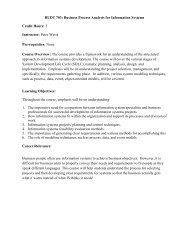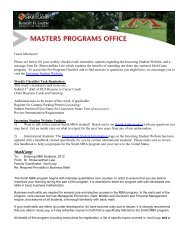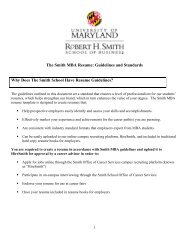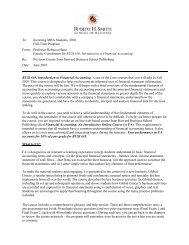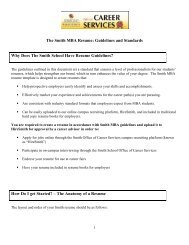HERE - Networth - University of Maryland
HERE - Networth - University of Maryland
HERE - Networth - University of Maryland
You also want an ePaper? Increase the reach of your titles
YUMPU automatically turns print PDFs into web optimized ePapers that Google loves.
Credit Hours: 3<br />
Instructor: Karen Wouters<br />
Pre-requisites: BUSI662 OR BUSI664<br />
BUMO712: Leadership Development<br />
Course Overview:<br />
Focuses on developing skills to inspire, influence and organize others to accomplish key goals.<br />
Building on leadership theories, course includes assessment & role-playing activities,<br />
discussions, cases, and exercises to assess and develop personal capabilities.<br />
Learning Objectives:<br />
� Learn how you and others who have worked with you view your unique strengths,<br />
pr<strong>of</strong>iciencies, and development needs.<br />
� Improve your receptivity and ability to respond to constructive feedback.<br />
� Learn how to provide effective, constructive feedback for developing the skills <strong>of</strong> others.<br />
� Design a self-development plan for enhancing your leadership skills.<br />
Career Relevance:<br />
An essential course for students interested in careers in human capital management consulting,<br />
leadership development brings skills that can be applied to any area in management. Learning<br />
how to be a better leader is relevant every functional area in business.
Credit Hours: 2<br />
Instructor: Joyce Russell<br />
Pre-requisites:<br />
BUMO714: Competitive and Collaborative Negotiation<br />
Course Overview:<br />
Increase negotiating self-confidence and improve capacity to achieve win-win solutions to<br />
organizational problems. Improve effectiveness at finding creative solutions to conflict.<br />
Learning Objectives:<br />
� Identify the strengths and weakness <strong>of</strong> different conflict styles.<br />
� Diagnose your own conflict style, including how to <strong>of</strong>fset weaknesses.<br />
� Understand fundamental differences in competitive and collaborative negotiation<br />
approaches<br />
� Gain practice in negotiating contracts and salaries.<br />
Career Relevance:<br />
Negotiations are at the core <strong>of</strong> many activities in business – from individual cases such as<br />
negotiating a job <strong>of</strong>fer to organizational actions such as negotiating a major acquisition. This<br />
course is particularly relevant to students interested in careers in consulting, marketing, general<br />
management, and new start-ups and entrepreneurs.
Credit Hours: 2<br />
Instructor: Myeong-Gu Seo<br />
Pre-requisites: BUSI662 OR BUSI664<br />
BUMO720: Understanding Organizational Change<br />
Course Overview: Develops the fundamental change knowledge and skills <strong>of</strong> MBA students<br />
who plan to work with organizations as change agents, whether internally as managerial<br />
employees or externally as outside consultants. Draws on literatures from organizational<br />
behavior, human resource management and strategic management to identify models as<br />
prescriptions <strong>of</strong> change.<br />
Learning Objectives:<br />
� Understand the key internal and external factors influencing the characteristics <strong>of</strong><br />
organizational change processes<br />
� Diagnose the nature and process <strong>of</strong> resistance to change and other sense-making<br />
processes that may occur during organizational change<br />
� Understand and analyze the essential steps and processes <strong>of</strong> planned<br />
organizational change<br />
Career Relevance:<br />
Students interested in careers in strategy / human capital management consulting will benefit a<br />
lot from understanding the major concepts and processes behind organizational change. Students<br />
interested in other functional areas will also benefit, as change involves all areas within<br />
organizations.
Credit Hours: 2<br />
Instructor: Myeong-Gu Seo / Susan Taylor<br />
Pre-requisites: BUMO720<br />
BUMO721: Managing Organizational Change<br />
Course Overview: Develops the advanced knowledge and skills <strong>of</strong> MBA students who plan to<br />
work with organizations as change agents. Concrete and useful strategies, tools, and<br />
interventions for diagnosing organizational change situations, analyzing problems, and designing<br />
and implementing organizational change. Diverse approaches to leading and managing<br />
various types <strong>of</strong> organizational change.<br />
Learning Objectives:<br />
� Understand and analyze the key phases and processes <strong>of</strong> planned organizational change<br />
� Select and apply the appropriate interventions and actions in certain phases <strong>of</strong><br />
organizational change<br />
� Understand different approaches to organizational change and apply appropriate<br />
approaches to different types <strong>of</strong> organizational change<br />
� Acquire useful skills and tools for effective change agent<br />
Career Relevance:<br />
Students interested in careers in strategy / human capital management consulting will benefit a<br />
lot from understanding the major concepts and processes behind organizational change. Students<br />
interested in other functional areas will also benefit, as change involves all areas within<br />
organizations.
Credit Hours: 2<br />
Instructor: Kay Bartol<br />
Pre-requisites:<br />
BUMO725: Networks and Influence<br />
Course Overview:<br />
Focuses on networks, social capital, and influence as they relate to operating effectively in<br />
organizations. It draws heavily on emerging literature related to social capital and networks, but<br />
also integrates concepts from persuasion, communication, and motivation literatures to aid your<br />
efforts to build a successful track record for yourself and your organization.<br />
Learning Objectives:<br />
This course will enable you to:<br />
��Audit your current network configurations<br />
��Calculate and apply network analytics<br />
��Assess your network persona<br />
��Develop a customized network strategy<br />
��Build your networking skills.<br />
��Manage on-going network relationships more effectively<br />
��Proactively engage in leadership via networks<br />
Career Relevance:<br />
Strong evidence indicates that effective networking skills are linked to career success indicators,<br />
such as:<br />
· more job <strong>of</strong>fers (a large proportion <strong>of</strong> job <strong>of</strong>fers originate via network connections)<br />
· faster promotions,<br />
· higher pay,<br />
· greater developmental opportunities,<br />
· enhanced performance, and<br />
· more effective leadership<br />
Networking skills are critical in every functional area <strong>of</strong> business.
Credit Hours: 2<br />
BUMO751: Implementing Strategy: Organizing to Compete<br />
Instructor: Paulo Prochno / Oliver Schlake<br />
Pre-requisites: BUSI 690<br />
Course Overview: Organizational dynamics <strong>of</strong> competitive advantage. Impact <strong>of</strong> alternative<br />
organizational structures, planning and control systems, human resource management practices,<br />
and executive leadership styles on the implementation <strong>of</strong> archetypically different strategies.<br />
Learning Objectives:<br />
� Understand the challenges <strong>of</strong> converting strategic intentions into reality.<br />
� Learn to recognize and think through organizational issues that are <strong>of</strong>ten critical in<br />
determining business success.<br />
� Study and discuss common organizational challenges faced when implementing major<br />
strategic initiatives such as launching a new product line, entering a new geographic<br />
market, or restructuring an industry by merging with or acquiring a competitor.<br />
� Learn concepts and reference cases to improve your organization's performance given its<br />
current design, as well as to fundamentally redesign your organization to implement new<br />
strategies.<br />
Career Relevance:<br />
Any student interested in careers in strategic management / consulting should take this course.<br />
No strategy can bring good results if implementation is not effective; the course is designed for<br />
all those who want to understand how to make strategies work.
Credit Hours: 2<br />
BUMO752: Strategic Growth for Emerging Companies<br />
Instructor: Jonathan Aberman / David Kirsch<br />
Pre-requisites: BUSI 660 and BUMO 753 (recommended)<br />
Course Overview:<br />
This course builds on other entrepreneurship courses (primarily BUMO 753 and BUSI 771) and<br />
explores the challenge <strong>of</strong> growing a successful business past the start up stage. Explores issues<br />
<strong>of</strong> strategy, organizational development, human resources, marketing and corporate structure to<br />
provide a comprehensive road map <strong>of</strong> the path to industry significance. Supplemented by<br />
readings, video and guest speakers, the course highlights the application <strong>of</strong> practical lessons<br />
leading to strategic growth and subsequent emergence as a player.<br />
Learning Objectives:<br />
� Identify and understand the growth strategies <strong>of</strong> different companies.<br />
� Interpret the competitive environment facing emerging companies.<br />
� Evaluate the likely effectiveness <strong>of</strong> a growth strategy for creating value.<br />
� Apply these skills in the specific context <strong>of</strong> their own ventures and careers.<br />
Career Relevance: This class would be <strong>of</strong> use to a student intending to be a start up<br />
entrepreneur, or to someone who intends to work as an advisor or employee in a rapidly growing<br />
business. Students taking this class will gain a specific understanding <strong>of</strong> the specific challenges<br />
<strong>of</strong> growth – taking a business from the first $1 million in revenue and creating a lasting business.<br />
It will provide practical skills that are essential for any entrepreneurial venture.
Credit Hours: 2<br />
Instructor: Jonathan Aberman<br />
Pre-requisites: BUSI 660<br />
BUMO753: Emerging Business Formation<br />
Course Overview: This class addresses the specific issues surrounding the creation <strong>of</strong> a brand<br />
new entrepreneurial business, the process <strong>of</strong> taking an idea for a business and creating an actual<br />
company. Topics covered include: business formation, core legal principals affecting start up<br />
creation, the spectrum <strong>of</strong> financing methods available to emerging businesses, creating<br />
management and organization and a practical application <strong>of</strong> the tools through practical projects.<br />
Learning Objectives:<br />
� Create a viable structure for emerging business success.<br />
� Avoid common mistakes that prevent the successful formation <strong>of</strong> many promising<br />
businesses.<br />
� Appreciate the legal issues surrounding employment, management and financing.<br />
� Appreciate the various corporate finance devices most applicable to emerging businesses.<br />
� Manage an emerging business.<br />
Career Relevance: The process <strong>of</strong> starting a new entrepreneurial business involves much more<br />
than the creation <strong>of</strong> a business plan. In order to successfully begin a business an entrepreneur<br />
must understand the process and specific issues and tools necessary to get a business established.<br />
This course is highly relevant to any student who intends to start his or her own business, or to<br />
students who intend to advise or work with startups.
Credit Hours: 2<br />
Instructor: Oliver Schlake / Jim Sanders<br />
Pre-requisites: BUSI 690<br />
BUMO756: Industry Analysis<br />
Course Overview: Conceptual framework and analytical tools for understanding the dynamics<br />
<strong>of</strong> industry structure. Impacts <strong>of</strong> past and future attractiveness <strong>of</strong> the industry on pr<strong>of</strong>itability.<br />
Developing and applying frameworks to devise competitive strategies in uncertain industries.<br />
Learning Objectives:<br />
� Describe conceptual frameworks <strong>of</strong> Industry Analysis such as Porters Five Forces and<br />
Value Net<br />
� Perform an Industry Analysis using class concepts in combination with a variety <strong>of</strong> data<br />
and information sources.<br />
� Utilize the attractiveness and future direction <strong>of</strong> an industry as basis for strategic planning<br />
� Understand the dynamics <strong>of</strong> industry driving forces and their potential trends and create<br />
qualitative industry scenarios to understand future attractiveness <strong>of</strong> changing industries.<br />
Career Relevance:<br />
Dealing with the economic drivers <strong>of</strong> industry pr<strong>of</strong>itability, this course is <strong>of</strong> special interest for<br />
those interested in careers in strategy consulting and finance; entrepreneurs will also benefit<br />
greatly from this course.
Credit Hours: 2<br />
Instructor: Rhonda Reger<br />
Pre-requisites: BUSI 690<br />
BUMO757: Competitor Analysis<br />
Course Overview:<br />
Understanding <strong>of</strong> the dynamics <strong>of</strong> how competitors interact in the marketplace. Understanding<br />
economic and behavioral motivations <strong>of</strong> industry players to design more effective strategies.<br />
Learning Objectives:<br />
� Describe conceptual frameworks <strong>of</strong> Competitor Analysis.<br />
� Identify and analyze competitive behavior <strong>of</strong> industry players and derive strategic<br />
direction from the results.<br />
� Understand the reasoning behind moves and countermoves <strong>of</strong> competing players and<br />
critique their effectiveness.<br />
� Develop and implement a strategic early warning system to stay ahead <strong>of</strong> anticipated<br />
competitive behavior.<br />
Career Relevance:<br />
Students interested in careers in strategy consulting and competitive intelligence should take this<br />
course. It will also be <strong>of</strong> interest for careers in marketing and product development.
Credit Hours: 2<br />
Instructor: Trent Carrier<br />
Pre-requisites:<br />
BUMO758J: Business <strong>of</strong> Biotech<br />
Course Overview: In the Business <strong>of</strong> Biotech, students will take an indepth look at the underlying<br />
business activities <strong>of</strong> biotechnology companies. The basic functions within a biotechnology business will<br />
be reviewed from a summary level in order to elaborate the mechanisms <strong>of</strong> value creation within the<br />
industry. Students will also meet senior leaders from the local biotech community in roundtable<br />
discussions focused on the practical experiences <strong>of</strong> building and running biotechnology companies. The<br />
course will conclude with team projects designed to reinforce the course principles within a highly<br />
interactive business analysis and negotiation.<br />
Learning Objectives:<br />
1) To understand the basic functions within a biotechnology business<br />
2) To understand how the functions combine to create enterprise value<br />
3) To apply classroom concepts to valuing biotech companies<br />
Career Relevance:<br />
This course is designed for students with a career interest in the biotechnology industry and students<br />
interested in evaluating companies in high technology markets
Credit Hours: 2<br />
Instructor: Jim Sanders<br />
Pre-requisites:<br />
BUMO758C: International Entrepreneurship<br />
Course Overview: This course focuses on the skills and knowledge useful for developing a new<br />
global business. Using the perspective <strong>of</strong> a startup entrepreneur we will examine the key success<br />
factors in creating a new business which has an international market focus. The course is<br />
organized around the creation <strong>of</strong> a venture which focuses on one or more non-US countries. The<br />
elements <strong>of</strong> a feasibility study are used as a method to look at the opportunities and issues in<br />
developing a new venture.<br />
Learning Objectives:<br />
The course is designed to help develop skills needed to:<br />
� assess the viability <strong>of</strong> a new business concept or idea<br />
� understand the issues involved in initiating a new venture in a non-US context<br />
� identify the critical assumptions underlying a new business concept and the milestones in<br />
implementing the business concept<br />
� understand how entrepreneurs in different cultures and economies create, find, control, and<br />
use resources to build a growth-oriented venture<br />
� develop skills in entrepreneurial management including opportunity recognition, market<br />
assessment, and feasibility analysis<br />
� develop an understanding <strong>of</strong> your personal entrepreneurship strategy<br />
Career Relevance:<br />
The primary focus is the process <strong>of</strong> creating a new international venture. The emphasis is on<br />
technology and high growth markets. Many <strong>of</strong> the examples will focus on the information<br />
technology industry, making it especially relevant for entrepreneurs interested in the IT sector.
Credit Hours: 2<br />
Instructor: Jim Sanders<br />
Pre-requisites:<br />
BUMO758D: Social Entrepreneurship<br />
Course Overview: This course is about using entrepreneurial skills to craft innovative responses<br />
to social problems. Entrepreneurs are particularly good at recognizing opportunities, exploring<br />
innovative approaches, mobilizing resources, managing risks, and building viable enterprises.<br />
These skills are just as valuable in the social sector as they are in business. Social<br />
entrepreneurship applies to both pr<strong>of</strong>it and non-pr<strong>of</strong>it firms who have programs designed to<br />
create social value.<br />
Learning Objectives:<br />
1) To examine the challenges and rewards <strong>of</strong> entrepreneurship and management in creating and<br />
developing social purpose organizations<br />
2) To build the knowledge, skills, and attitudes necessary for responding successfully to the challenges<br />
3) To provide an appreciation <strong>of</strong> the relative strengths and weaknesses <strong>of</strong> different organizational<br />
forms, nonpr<strong>of</strong>it and for-pr<strong>of</strong>it, in providing social goods and services<br />
Career Relevance:<br />
This course is relevant for entrepreneurs interested in opening new business in the social sector<br />
and, more generally, for students wishing to develop careers related to the social sector.
BUMO758F: Entrepreneurial Issues in Family and Closely-Held Businesses<br />
Credit Hours: 2<br />
Instructor: Jonathan Aberman<br />
Pre-requisites:<br />
Course Overview: Family and closely-held businesses are the largest employer and wealth<br />
creator in the US economy. This class provides students with the practical tools to be effective<br />
working in and advising these unique businesses. Topics addressed will include: the unique<br />
aspects <strong>of</strong> family-owned businesses, legal and financial issues, generational conflict and<br />
resolution, transitions, corporate governance, use <strong>of</strong> outside advisors and specific growth<br />
strategies.<br />
Learning Objectives:<br />
• Develop an appreciation for the different types <strong>of</strong> family businesses.<br />
• Gain an appreciation <strong>of</strong> the specific psychology <strong>of</strong> family businesses and develop tools for<br />
managing conflict and transition in a family perspective.<br />
• Develop an appreciation for family wealth preservation and legacy planning.<br />
• Develop the tools and skills necessary to help manage family owned businesses.<br />
Career Relevance: Family owned businesses are the largest employers in the United States, and<br />
include a group <strong>of</strong> companies ranging from neighborhood restaurants to international trading<br />
houses and industrial companies. All <strong>of</strong> these businesses have in common certain issues and<br />
challenges that result from the interplay <strong>of</strong> family and entrepreneurship. Students who are<br />
intending to work in their family’s business, or otherwise intending to be involved in a family<br />
owned business should take this class.
Credit Hours: 2<br />
Instructor: Paulo Prochno / Oliver Schlake<br />
Pre-requisites:<br />
BUMO758G: Innovation Management<br />
Course Overview: The course is designed to give students a broad view on issues related to the<br />
management <strong>of</strong> innovations. It covers both external dynamics <strong>of</strong> innovations and internal<br />
management activities, with special emphasis on knowledge development and learning processes<br />
within organizations<br />
Learning Objectives:<br />
Students will learn ways to answer the following questions:<br />
� How do new technologies arise and what sorts <strong>of</strong> organizations sponsor different types <strong>of</strong><br />
technological breakthroughs?<br />
� How do standards emerge and reinforce the dominance <strong>of</strong> various technologies?<br />
� Why do some innovations create ruptures for established companies?<br />
� How do organizations respond to the challengescoming from innovations<br />
Career Relevance:<br />
Though specially relevant for students interested in careers in new product development and<br />
entrepreneurship, innovation is at the core <strong>of</strong> strategic renewal, making this course relevant to a<br />
broad audience in management.
Credit Hours: 2<br />
Instructor: Protiti Dastidar<br />
Pre-requisites:<br />
BUMO758K: Management Consulting<br />
Course Overview: This course <strong>of</strong>fers an in-depth overview <strong>of</strong> the management consulting<br />
industry. Topics include the structure, conduct and performance <strong>of</strong> the management consulting<br />
industry; firms in the industry and their competitive strategies; key strategic and organizational<br />
issues facing these firms; ideas, tools and frameworks that these firms have put into practice;<br />
problem-solving, communication, and client relation skills that are necessary for success in the<br />
industry; management consulting careers; and ethical issues facing management consultants.<br />
Learning Objectives:<br />
The course aims to help students learn how to:<br />
� Understand the dynamics <strong>of</strong> the management consulting industry<br />
� Build critical (transferrable) management consulting skills:<br />
o Break up a complicated problem into logical, independent pieces<br />
o Synthesize information to drive key conclusions<br />
o Develop specific recommendations among a range <strong>of</strong> feasible alternatives<br />
o Present recommendations and conclusions to persuade and gain buy-in<br />
o Influence others effectively using a range <strong>of</strong> ethical tactics<br />
Career Relevance:<br />
Essential for students interested in strategy consulting, it is also relevant for careers in other areas<br />
in consulting.
Credit Hours: 3<br />
Instructor: Brent Goldfarb<br />
Pre-requisites:<br />
BUMO777: Technology Commercialization<br />
Course Overview: Students will build commercialization plans for <strong>University</strong> <strong>of</strong> <strong>Maryland</strong><br />
Technologies protected by the Office <strong>of</strong> Technology Commercialization. Students will learn<br />
different mechanisms for successful technology transfer and work closely with the instructor, the<br />
Dingman Center managing director and affiliated pr<strong>of</strong>essionals. Successful students may pursue<br />
additional funding through the Dingman Center to support further commercialization efforts.<br />
Learning Objectives:<br />
� the source, discovery, and evaluation <strong>of</strong> technological opportunities<br />
� the process <strong>of</strong> organizing innovation to produce new technology that satisfies the needs<br />
<strong>of</strong> customers<br />
� the different mechanisms available to appropriate the returns from the exploitation <strong>of</strong><br />
technological opportunities<br />
� the evaluation <strong>of</strong> whether opportunities are appropriate for independent entrepreneurs or<br />
large firms.<br />
Career Relevance:<br />
Firms that patent produce more than 75% <strong>of</strong> the value added in the economy. This course is for<br />
individuals who wish to understand how technology leads to competitive advantage through<br />
hands-on experiences. The course explores how to develop business models for technologies<br />
and how to develop technologies to fit business models within the current technological<br />
landscape. Students receive hands-on experience with live technologies & stakeholders.
Credit Hours: 2<br />
Instructor: Brent Goldfarb / David Kirsch<br />
Pre-requisites:<br />
BUSI660: Entrepreneurship and New Ventures<br />
Course Overview: Provides an introduction to important tools and skills necessary to create and<br />
grow a successful new venture. Integrates research findings from a range <strong>of</strong> different practical<br />
and intellectual perspectives, including psychology, sociology, economics, strategic<br />
management, and history into practical, hands on lessons for an entrepreneur. Class projects<br />
provide the foundations for new, real businesses.<br />
Learning Objectives:<br />
� What? We will describe the process <strong>of</strong> entrepreneurship as an activity originating from<br />
market need, the creative recognition <strong>of</strong> opportunity, and innovative problem solving in<br />
the business environment.<br />
� How? We will understand the process by which opportunities are exploited through the<br />
creation <strong>of</strong> new ventures.<br />
� Through the development <strong>of</strong> an industry analysis and / or feasibility study, we will<br />
evaluate the opportunity associated with a given venture idea along with relevant<br />
constraints.<br />
Career Relevance:<br />
This course is for students who might one day be interested in leading or working for or with a<br />
new venture. Thus, this course is targeted to those currently considering a specific business<br />
opportunity, as well as those who might be interested in founding a new venture at a later time<br />
(indeed, research indicates that MBAs are more likely to found their own venture later rather<br />
than sooner in their career). Additionally, the covered concepts and frameworks are highly<br />
applicable for those interested in serving in an executive role at a young venture (e.g., the Meg<br />
Whitman / Steve Ballmer model) or those interested in helping established firms interact with<br />
new firms (a topic <strong>of</strong> increasing importance for dynamic and innovative strategies).
Credit Hours: 2<br />
Instructor: Oliver Schlake<br />
Pre-requisites:<br />
BUSI661: Creativity for Business Leaders and Entrepreneurs<br />
Course Overview: Examines the concept <strong>of</strong> creativity as it applies in today's and tomorrow's<br />
complex business environment. An overview <strong>of</strong> the cognitive foundations <strong>of</strong> creativity, examines<br />
many <strong>of</strong> the preconceived notions about creativity in business and discusses multiple ways in<br />
which creativity can help business leaders and entrepreneurs to succeed. Topics include<br />
creativity techniques for groups and individuals, creativity as a foundation to recognize business<br />
opportunities and develop innovative products and services, selecting ideas and making them<br />
stick, mental and organizational obstacles to creativity as well as an overview <strong>of</strong> electronic tools<br />
to increase creative capability.<br />
Learning Objectives:<br />
� Comprehend the costs and benefits <strong>of</strong> employing creative problem solving to managerial<br />
challenges<br />
� Describe a wide range <strong>of</strong> creative thinking and problem-solving techniques;<br />
� Awareness <strong>of</strong> IT tools to support creative problem solving<br />
� Employ self-selected creative thinking and problem solving techniques in a wide range<br />
<strong>of</strong> practical settings and situations;<br />
� Collaborate effectively in creative thinking and problem-solving<br />
� Understand how to plan and facilitate a creative session with several participants in a<br />
business setting.<br />
Career Relevance:<br />
This course has a very broad appeal to many different areas in business. Entrepreneurs and<br />
consultants will find it especially relevant.
Credit Hours: 2<br />
Instructor: Anil Gupta / Paulo Prochno<br />
Pre-requisites:<br />
BUSI674: Globalizing the Enterprise<br />
Course Overview: Focuses on the "strategic" and "organizational" questions that a company<br />
must address as it globalizes its footprint. Among the questions that will be addressed are: What<br />
are the potential benefits, costs, and risks associated with going abroad? What differentiates a<br />
"global" from a "multidomestic" industry? What are the sources <strong>of</strong> competitive advantage in a<br />
global context?<br />
Learning Objectives:<br />
� Understand the major drivers for global expansion<br />
� Understand why, when and where to go global<br />
� Decide on best mode <strong>of</strong> entry into new locations<br />
� Know how to structure and manage the global network <strong>of</strong> locations<br />
Career Relevance:<br />
Anyone interested in working in multinational companies will benefit from this course. With the<br />
rise <strong>of</strong> multinationals from emerging markets creating new challenges for local companies, this<br />
course is also useful for those working in environments where there is significant competition<br />
from foreign players.
Credit Hours: 2<br />
BUSI771: New Venture Financing<br />
Instructor: Robert Baum / Jonathan Aberman<br />
Pre-requisites: BUSI 660 and BUMO 753 (recommended)<br />
Course Overview: Development <strong>of</strong> skills for financing new ventures (both small and potentially<br />
large). Exploration <strong>of</strong> various funding sources. Criteria used in evaluation and decision process,<br />
including commercial banks, venture capital companies, small business investment companies,<br />
underwriters, private placement-financial consultants, mortgage bankers, and small business<br />
innovative research grants (U.S. Government).<br />
Learning Objectives:<br />
As a result <strong>of</strong> taking this course, students should be better able to:<br />
� Analyze the feasibility <strong>of</strong> financing new, transformed, and growing ventures.<br />
� Understand the advantages and disadvantages <strong>of</strong> the full array <strong>of</strong> financing options.<br />
� Acquire financing for a new or growing venture.<br />
� Understand applicable valuation methods.<br />
� Understand the motivations and requirements <strong>of</strong> investors and other financing sources.<br />
Career Relevance:<br />
Corporate finance for emerging businesses is distinct from corporate finance for established<br />
businesses. Understanding the financing tools available, and the structure and mechanics to<br />
utilize them is an essential part <strong>of</strong> any start up entrepreneur’s tool kit. Any student intending to<br />
start his or her own business should take this class, as should students that would like to better<br />
understand the process <strong>of</strong> growing and financing emerging businesses.







